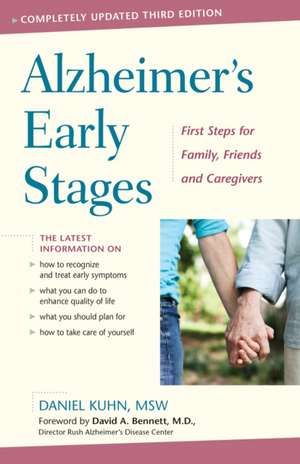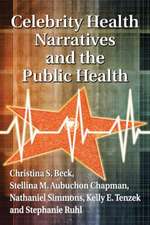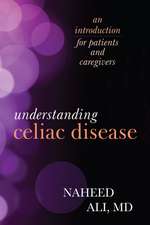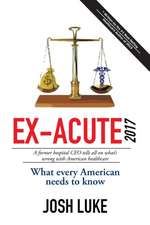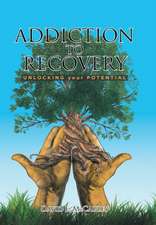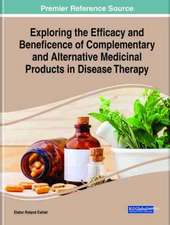Alzheimer's Early Stages: First Steps for Family, Friends, and Caregivers
Autor Daniel Kuhn David A. Bennetten Limba Engleză Paperback – 7 oct 2013
Alzheimer's disease has a beginning, not just an end; and as with all beginnings, one must take the first steps before one takes the last. The problems encountered early in the disease and the advice required then are very different from what is needed later in the disease. This book enlightens us about these early stages. Daniel Kuhn seeks to replace fear with knowledge, in the hope that knowledge will lead to empowerment. What does the disease look like and feel like when it first occurs? What types of problems are encountered first by the person with the disease, and by their family and friends? How can these problems be dealt with most effectively?
This book is also about reversing the dehumanization that unfortunately is now associated with Alzheimer's disease. Although the disease should be feared and respected, it is not a cause for embarrassment or shame.... This book will serve as a discussion tool to encourage open and frank discussions about mild Alzheimer's disease among patients and family members.
In Part One, readers learn about the medical aspects of Alzheimer's through descriptions of diagnosis and the progression of the disease from its earliest origins, and explanations of the current and proposed medical treatments. This section also describes potential non-drug means of treating the disease, such as physical exercise, and speculative treatments, such as coconut oil, that are gaining popularity yet are not strongly supported by scientific evidence.
Part Two addresses the practical aspects of day-to-day care. Here, Kuhn explains the changing world of the diagnosed individual. Communication barriers associated with Alzheimer's disease are described and ways to overcome them are offered. Readers come to understand the change in their relationships due to the nature of the disease as well as how to adjust their expectations as these changes occur. Kuhn also describes the importance of anticipating long-term care needs through legal and financial planning.
In Part Three, caregivers are given steps to care for themselves including how to obtain needed help from professionals and friends. Emphasis is placed on maintaining one's own physical, mental, and social health as an important aspect of ensuring the well-being of someone with Alzheimer's disease.
Among the many topics covered are ways to ensure that people with Alzheimer's maintain a high quality life, such as ways of improving communication, selecting appropriate activities, addressing safety concerns, and including children in patient's lives. The book also includes a discussion of what the experience of having Alzheimer's is like, and an analysis of the slow, but hopeful progress being made in the treatment and prevention of the disease.
In his introduction, Daniel tells us, "This book is not a step-by-step guide to the "correct" or "best" way to manage the inherent challenges of this disease. Rather, throughout this book I address general principles about coping strategies and offer specific suggestions. Whenever possible, I rely on the experiences of people living with Alzheimer's disease to illustrate key points."
This book is practical. It tells you what you can and should do, and in some cases, what you should not do. Like a good cookbook, it provides guidance and advice but leaves room for individuality and experimentation.
| Toate formatele și edițiile | Preț | Express |
|---|---|---|
| Paperback (1) | 113.19 lei 3-5 săpt. | |
| Hunter House Publishers – 7 oct 2013 | 113.19 lei 3-5 săpt. | |
| Hardback (1) | 188.03 lei 3-5 săpt. | |
| Hunter House Publishers – 7 oct 2013 | 188.03 lei 3-5 săpt. |
Preț: 113.19 lei
Nou
Puncte Express: 170
Preț estimativ în valută:
21.66€ • 23.52$ • 18.20£
21.66€ • 23.52$ • 18.20£
Carte disponibilă
Livrare economică 01-15 aprilie
Preluare comenzi: 021 569.72.76
Specificații
ISBN-13: 9780897936675
ISBN-10: 0897936671
Pagini: 336
Dimensiuni: 137 x 216 x 23 mm
Greutate: 0.41 kg
Ediția:Third Edition
Editura: Hunter House Publishers
ISBN-10: 0897936671
Pagini: 336
Dimensiuni: 137 x 216 x 23 mm
Greutate: 0.41 kg
Ediția:Third Edition
Editura: Hunter House Publishers
Cuprins
Foreword
Acknowledgments
Introduction to the Third Edition
Part I: What Is Alzheimer’s Disease?
Chapter 1: The Need for an Accurate Diagnosis
What Is Normal in the Aging Brain?
How Alzheimer’s Disease Changes the Brain
What Research Says About Its Origins
Getting an Accurate Diagnosis
The Value of a Diagnosis
Chapter 2: Symptoms of the Early Stages of Alzheimer’s Disease
What Is Recent Memory?
Beginning Signs
An Emerging Pattern
Other Troubling Symptoms
One or More Symptoms Sometimes Present
Mood and Behavioral Changes
Chapter 3: Progress in Treatment and Prevention of Alzheimer’s Disease
Current Medical Treatments
Progress in Treatment and Prevention
Participating in Clinical Drug Trials and Other Studies
The Limits of Medicine
Chapter 4: Alternative Therapies
What Do Risk Factors Tell Us?
Physical Exercise
Brain Games
Diet and Supplements
Buyer Beware
Balancing Activity and Relaxation
Part II: Giving Care
Chapter 5: What Is It Like to Have Alzheimer’s Disease?
Common Experiences and Feelings
Varying Degrees of Awareness of Symptoms
The Importance of One's Social Environment
What Some Family Members Have to Say
Chapter 6: How Relationships, Roles, and Responsibilities Change
Accepting the Diagnosis
Stepping into the Leadership Role
When Your Partner Has AD
When Your Parent Has AD
Telling Others About the Diagnosis
Involving Others in Care
Chapter 7: Making Practical Decisions
Ensuring Safety on the Road
Maintaining Good Health
Ensuring Financial Well-Being
Alternative Living Situations for the Person with AD
Doing the Right Thing
Chapter 8: Improving Communication
Communication Difficulties
Redefining Your Relationship
Ways of Listening and Talking with a Person with AD
Whose Problem Is It?
Chapter 9: Helping a Person with AD to Plan for the Future
Finding the Time
Legal Considerations
Financing the Cost of Care
Rethinking the Living Situation
Finding the Right Professionals
Chapter 10: Keeping a Person with AD Active, Happy, and Healthy
The Elements of Well-Being
Selecting Appropriate Activities
Traveling
Participating in Social Events
Reminiscing
Spiritual and Religious Practices
Being Around Pets and Plants
Involving Children
Part III: Caring for Yourself
Chapter 11: Self-Renewal for Family and Friends
Listening to Your Body and Mind
The Importance of Grief Work
Individual and Family Counseling
Exploring Spiritual Resources
Keeping a Journal
Maintaining a Sense of Humor
Chapter 12: Obtaining the Help You May Need
Using Community Resources
Participating in a Support Group
Using Help at Home
Choosing an Adult Day Center
Learning More About AD
Chapter 13: Voices of Experience
Questions and Answers
Lessons Learned
Epilogue: Advocating for Change
The Politics of Health Care
Our Aging Society and Youth Culture
Personal Change
Resources
AD Research Centers in the United States Funded by the National Institute on Aging
Print and Video Resources
Resources on the Web
Acknowledgments
Introduction to the Third Edition
Part I: What Is Alzheimer’s Disease?
Chapter 1: The Need for an Accurate Diagnosis
What Is Normal in the Aging Brain?
How Alzheimer’s Disease Changes the Brain
What Research Says About Its Origins
Getting an Accurate Diagnosis
The Value of a Diagnosis
Chapter 2: Symptoms of the Early Stages of Alzheimer’s Disease
What Is Recent Memory?
Beginning Signs
An Emerging Pattern
Other Troubling Symptoms
One or More Symptoms Sometimes Present
Mood and Behavioral Changes
Chapter 3: Progress in Treatment and Prevention of Alzheimer’s Disease
Current Medical Treatments
Progress in Treatment and Prevention
Participating in Clinical Drug Trials and Other Studies
The Limits of Medicine
Chapter 4: Alternative Therapies
What Do Risk Factors Tell Us?
Physical Exercise
Brain Games
Diet and Supplements
Buyer Beware
Balancing Activity and Relaxation
Part II: Giving Care
Chapter 5: What Is It Like to Have Alzheimer’s Disease?
Common Experiences and Feelings
Varying Degrees of Awareness of Symptoms
The Importance of One's Social Environment
What Some Family Members Have to Say
Chapter 6: How Relationships, Roles, and Responsibilities Change
Accepting the Diagnosis
Stepping into the Leadership Role
When Your Partner Has AD
When Your Parent Has AD
Telling Others About the Diagnosis
Involving Others in Care
Chapter 7: Making Practical Decisions
Ensuring Safety on the Road
Maintaining Good Health
Ensuring Financial Well-Being
Alternative Living Situations for the Person with AD
Doing the Right Thing
Chapter 8: Improving Communication
Communication Difficulties
Redefining Your Relationship
Ways of Listening and Talking with a Person with AD
Whose Problem Is It?
Chapter 9: Helping a Person with AD to Plan for the Future
Finding the Time
Legal Considerations
Financing the Cost of Care
Rethinking the Living Situation
Finding the Right Professionals
Chapter 10: Keeping a Person with AD Active, Happy, and Healthy
The Elements of Well-Being
Selecting Appropriate Activities
Traveling
Participating in Social Events
Reminiscing
Spiritual and Religious Practices
Being Around Pets and Plants
Involving Children
Part III: Caring for Yourself
Chapter 11: Self-Renewal for Family and Friends
Listening to Your Body and Mind
The Importance of Grief Work
Individual and Family Counseling
Exploring Spiritual Resources
Keeping a Journal
Maintaining a Sense of Humor
Chapter 12: Obtaining the Help You May Need
Using Community Resources
Participating in a Support Group
Using Help at Home
Choosing an Adult Day Center
Learning More About AD
Chapter 13: Voices of Experience
Questions and Answers
Lessons Learned
Epilogue: Advocating for Change
The Politics of Health Care
Our Aging Society and Youth Culture
Personal Change
Resources
AD Research Centers in the United States Funded by the National Institute on Aging
Print and Video Resources
Resources on the Web
Recenzii
"Kuhn guides families in developing a philosophy of care, offering clear and current information on the nature of the illness ... this is a much needed addition to the Alzheimer's literature. [Recommended] for all consumer health collections."
—Library Journal
"[A]n Alzheimer's classic to be sure. A must-have for the well-read persons interested in Alzheimer's Disease."
—American Journal of Alzheimer's Disease
"[D]oes a sensitive and comprehensive job of addressing the medical, emotional, and practical concerns inherent in the early stages ... It is a valuable addition to the Alzheimer's literature and Mr. Kuhn is to be commended for this very worthwhile contribution."
—Perspectives: A Newsletter for Individuals Diagnosed with Alzheimer's Disease
"This book contains so much of value which could be used to support anyone with a degree of cognitive impairment and it is a book filled with compassion, care and optimism."
— Sian Williams, Net Galley Reviewer
—Library Journal
"[A]n Alzheimer's classic to be sure. A must-have for the well-read persons interested in Alzheimer's Disease."
—American Journal of Alzheimer's Disease
"[D]oes a sensitive and comprehensive job of addressing the medical, emotional, and practical concerns inherent in the early stages ... It is a valuable addition to the Alzheimer's literature and Mr. Kuhn is to be commended for this very worthwhile contribution."
—Perspectives: A Newsletter for Individuals Diagnosed with Alzheimer's Disease
"This book contains so much of value which could be used to support anyone with a degree of cognitive impairment and it is a book filled with compassion, care and optimism."
— Sian Williams, Net Galley Reviewer
Notă biografică
Daniel Kuhn has been a social worker and educator focused on enhancing the well-being of people with Alzheimer’s disease and other types of dementia, as well as that of their families, since 1987. Through direct service, training, research, consultation, and program development, Kuhn has supported the missions of several nonprofit healthcare organizations in the Chicago area. The author and co-author of more than 50 publications, he has given hundreds of presentations for professional and family caregivers throughout the United States and Canada. Kuhn currently leads a grant-funded project to promote comfort care for people with dementia at Rainbow Hospice and Palliative Care, based in Mount Prospect, Illinois.
Extras
From the Introduction: Why the Third Edition of this Book?
The first edition of this book was published in 1999, shortly after the first drug treatments for Alzheimer’s disease were developed, primarily for people in its early stages. Although these new drugs were imperfect, there was much hope for further medical improvements.
The second edition of this book was published four years later, when promising research was believed to be paving the way toward dramatic breakthroughs and a world without Alzheimer’s disease. That hope has since given way to the harsh reality that Alzheimer’s disease is far more complex than most scientists had imagined.... Nevertheless, advances have been made in understanding the origins of the disease, and identifying ways to diagnose, treat, and prevent it....
This book is intended to serve as a beginning guide for family members and friends of people in the early stages of Alzheimer’s disease — after symptoms emerge. Although many fine books about Alzheimer’s disease have been published, this was the first one written exclusively about its early stages, and it will hopefully continue to be a valued resource for everyone confronting this disease.
The latest medical information about the disease is explained, including new definitions about the disease itself, new diagnostic techniques, as well as current and proposed treatments. Whenever possible, all facts are supported by solid, evidence-based research. Whenever the research evidence is weak or nonexistent, such limitations are duly noted. Practical advice about coping with the disease now and help in planning for the future are also offered. This advice is based on my professional experience over the past 40 years working with individuals and families affected by Alzheimer’s disease.
My overall goal is to shed light on the concerns of family members and friends who are newcomers to this troubling disease. They hold the key to enhancing or detracting from the quality of life of those who are diagnosed. If you have a relative or friend who has recently been diagnosed with Alzheimer’s disease, this book aims to help you deal with the challenges at hand. Also, if you know someone who is having difficulties with memory, thinking, language, and other brain functions, I hope this book will encourage you to seek help for that individual. Delaying a diagnosis often leads to needless frustration for all concerned....
The beginning of Alzheimer’s is a critical time to develop a philosophy of care and ways of coping that will promote a good quality of life both for the person with the disease and for family and friends. Once you are armed with the information and advice offered in this book, hope and self-confidence can replace worry and fear. Becoming familiar with the disease in its initial stages will also help you to prevent or minimize crises later on....
I have been privileged to hear the stories of thousands of individuals with the disease, and those of their relatives and friends.… An important lesson I have learned is that there is no single right way of coping. Therefore, this book is not a step-by-step guide to the “correct” or “best” way to manage the inherent challenges of this disease. Rather, throughout this book I address general principles about coping strategies and offer specific suggestions. Whenever possible, I rely on the experiences of people living with Alzheimer’s disease to illustrate key points....
How this Book Is Organized
The first part of this book concerns the medical aspects of Alzheimer’s disease. Information about basic medical facts will help you to begin dealing with practical everyday issues. Although these chapters are full of facts about diagnosis and treatment, you should not be too concerned about absorbing these details right away.... A solid medical understanding of Alzheimer’s disease is useful, but the challenge to live a good quality of life with the disease is far more difficult to master. Ways to promote a good quality of life for both you and the diagnosed individual are central to this book.
Part 2 addresses day-to-day concerns including the emotional, social, legal, and financial effects of the disease on you, on your family and friends, and, above all, on your loved one with the disease. Understanding your changing roles and responsibilities in relation to the person with the disease is central to this undertaking.
Part 3 specifically addresses how to best take care of yourself as you care for your loved one with Alzheimer’s disease. Achieving a balance between your needs and the needs of the person with the disease is key to coping successfully.
The epilogue lays out an agenda for change in public policy concerning research into the treatment and prevention of Alzheimer’s disease.… Finally, there is a resource section that will help you learn more about the disease now and as it progresses over the coming months and years.
A note about the title of this book: Although the book is primarily concerned with caring for people with Alzheimer’s disease, the ideas presented here may well apply to individuals and families coping with many other irreversible brain disorders, also known as dementia. The term early stages refers to the fact that the disease unfolds over many years, perhaps decades as new research shows. My use of the word stages is an attempt to indicate that you will face different challenges along the continuum of the disease. Also, I have avoided using terms like patient, victim, or sufferer, and instead refer to “people” with Alzheimer’s disease. Maintaining one’s dignity and status as a whole person in the face of this dehumanizing disease is perhaps the greatest challenge for everyone involved....
======================================
From Chapter 1: The Need for an Accurate Diagnosis
It is evident that we are dealing with a peculiar, little-known disease process.
— Alois Alzheimer, 1906
... A century ago, an American’s average life span was forty-nine years, but now it has reached seventy-six. What accounts for this dramatic change in longevity that has resulted in an aging boom today? As a society we began to believe that life-threatening diseases could be treated, cured, and prevented. Improvements in public health during the past century altered our expectations. Lifestyle changes and medical breakthroughs have made a long life a reality for the average person in developed countries. In other words, there is no need today to think that disabling conditions associated with aging are “normal” just because they are commonplace. Such a shift in our thinking and our medical technology has spawned a large and growing “anti-aging” movement in health, fitness, and medicine.
What Is Normal and Abnormal in the Aging Brain?
Forgetfulness is a universal human experience. For most of us, forgetting something represents nothing more than a temporary inconvenience, since usually the forgotten bits of information are trivial. Although advancing age typically brings about minor changes in memory, thinking, and other brain functions, most older adults tend to compensate quite well for these changes. And although older people may generally be more forgetful than they were in their younger years, this level of forgetfulness usually does not interfere with the overall quality of their lives. This condition is referred to as “benign forgetfulness.” Although the majority of older people experience this minor problem, the scientific basis for this change late in life is not yet completely understood. Although most people aged sixty-five years and older experience a slight decline in memory and other brain functions, less than 15 percent decline in significant ways.
Older people may occasionally complain about forgetting names or misplacing things around the home. They may also notice these incidents occur with greater regularity as they age. These moments of absent-mindedness do not seriously affect one’s lifestyle and may simply be an exaggeration of forgetfulness experienced by everyone, regardless of age. Most of these people would perform very well on tests of memory and thinking if medically evaluated.
At first glance, age-related forgetfulness may appear similar to the forgetfulness associated with Alzheimer’s disease (hereafter referred to as AD). If this is the case, then what exactly is the difference between these two states, one considered a normal part of aging and the other a sign of disease? There is currently no single test available that provides a clear answer to this basic question. A diagnosis of AD cannot yet been made with a simple biological test and requires that certain “clinical” criteria be met, based on one’s symptoms such as memory loss worse than expected for one’s age. Advances in brain science are offering important insights into the differences between AD and earliest stages of the disease.
It is now commonly understood that memory loss and other cognitive impairments can be traced on a continuum between “normal” and “disease” — differences are merely a matter of degree. For someone who is actually experiencing memory problems, however, there is a notable difference between mild memory loss that is merely annoying and severe memory loss that disrupts one’s life.
==============================================
From Chapter 2: Symptoms of the Early Stages of Alzheimer’s Disease
“I know that I have a problem, but it doesn't bother me. If you're going to have it handed to you, you have got to take it, anyway. So that is the way I look at it.”
— Glenn Campbell, country music star, diagnosed with Alzheimer’s disease
What Is Recent Memory?
The type of memory affected by AD is generally called “recent memory.” A person whose recent memory is impaired typically forgets events that took place within the past hour, day, or week. Entire episodes or fragments of an episode cannot be recalled because new learning does not occur or is disrupted. Recent memory is quite different from remote memory, which involves events, places, or people from the distant past and often remains intact in the early stages of the disease. For example, a person with AD may not be able to recall what she had for breakfast today but may well recall the details of a high school prom some sixty years earlier. The ability to perform personal-care tasks such as dressing and bathing usually remains intact too. Lots of abilities may be well preserved at this stage whereas other abilities may be impaired. There is great variability among affected people in how the disease is first manifested and progresses over time, although impairment of recent memory is the common feature.
Beginning Signs
As noted in the first chapter, what is commonly referred to as the early signs of AD do not actually mark the beginning of the disease but are the first observable and persistent signs. At this point on the disease continuum, the threshold between MCI and AD has been crossed, although that turning point is largely a judgment call by a physician. Most family members of a person with AD are able to recall unusual incidents that occurred months or years before a loved one was diagnosed with AD. They may have dismissed these warning signs as nothing more than eccentric behavior or as a normal part of the aging process. Only when a pattern emerges over time are these strange incidents put into the proper perspective. The case of former President Ronald Reagan is typical in this regard.
================================================
From Chapter 3: Treatment and Prevention of Alzheimer’s Disease
Every complex problem has a solution that is simple, neat, and wrong.
— H. L. Mencken
In this chapter I will review current options for treating AD as well as some options that may become available in the future for treating, slowing down, and preventing the disease. At present, there is nothing available to stop or reverse symptoms. A handful of drug treatments are available that are modestly effective in improving symptoms and slowing down the progression of AD, but not in all cases. Better drugs may be on the horizon. These include drugs that are in testing phases at research centers and clinics, mainly in North America, Europe, and Japan. And although claims that certain herbs and dietary supplements may enhance memory have not yet been substantiated, some alternative medicines may also prove beneficial.
The first edition of this book was published in 1999, shortly after the first drug treatments for Alzheimer’s disease were developed, primarily for people in its early stages. Although these new drugs were imperfect, there was much hope for further medical improvements.
The second edition of this book was published four years later, when promising research was believed to be paving the way toward dramatic breakthroughs and a world without Alzheimer’s disease. That hope has since given way to the harsh reality that Alzheimer’s disease is far more complex than most scientists had imagined.... Nevertheless, advances have been made in understanding the origins of the disease, and identifying ways to diagnose, treat, and prevent it....
This book is intended to serve as a beginning guide for family members and friends of people in the early stages of Alzheimer’s disease — after symptoms emerge. Although many fine books about Alzheimer’s disease have been published, this was the first one written exclusively about its early stages, and it will hopefully continue to be a valued resource for everyone confronting this disease.
The latest medical information about the disease is explained, including new definitions about the disease itself, new diagnostic techniques, as well as current and proposed treatments. Whenever possible, all facts are supported by solid, evidence-based research. Whenever the research evidence is weak or nonexistent, such limitations are duly noted. Practical advice about coping with the disease now and help in planning for the future are also offered. This advice is based on my professional experience over the past 40 years working with individuals and families affected by Alzheimer’s disease.
My overall goal is to shed light on the concerns of family members and friends who are newcomers to this troubling disease. They hold the key to enhancing or detracting from the quality of life of those who are diagnosed. If you have a relative or friend who has recently been diagnosed with Alzheimer’s disease, this book aims to help you deal with the challenges at hand. Also, if you know someone who is having difficulties with memory, thinking, language, and other brain functions, I hope this book will encourage you to seek help for that individual. Delaying a diagnosis often leads to needless frustration for all concerned....
The beginning of Alzheimer’s is a critical time to develop a philosophy of care and ways of coping that will promote a good quality of life both for the person with the disease and for family and friends. Once you are armed with the information and advice offered in this book, hope and self-confidence can replace worry and fear. Becoming familiar with the disease in its initial stages will also help you to prevent or minimize crises later on....
I have been privileged to hear the stories of thousands of individuals with the disease, and those of their relatives and friends.… An important lesson I have learned is that there is no single right way of coping. Therefore, this book is not a step-by-step guide to the “correct” or “best” way to manage the inherent challenges of this disease. Rather, throughout this book I address general principles about coping strategies and offer specific suggestions. Whenever possible, I rely on the experiences of people living with Alzheimer’s disease to illustrate key points....
How this Book Is Organized
The first part of this book concerns the medical aspects of Alzheimer’s disease. Information about basic medical facts will help you to begin dealing with practical everyday issues. Although these chapters are full of facts about diagnosis and treatment, you should not be too concerned about absorbing these details right away.... A solid medical understanding of Alzheimer’s disease is useful, but the challenge to live a good quality of life with the disease is far more difficult to master. Ways to promote a good quality of life for both you and the diagnosed individual are central to this book.
Part 2 addresses day-to-day concerns including the emotional, social, legal, and financial effects of the disease on you, on your family and friends, and, above all, on your loved one with the disease. Understanding your changing roles and responsibilities in relation to the person with the disease is central to this undertaking.
Part 3 specifically addresses how to best take care of yourself as you care for your loved one with Alzheimer’s disease. Achieving a balance between your needs and the needs of the person with the disease is key to coping successfully.
The epilogue lays out an agenda for change in public policy concerning research into the treatment and prevention of Alzheimer’s disease.… Finally, there is a resource section that will help you learn more about the disease now and as it progresses over the coming months and years.
A note about the title of this book: Although the book is primarily concerned with caring for people with Alzheimer’s disease, the ideas presented here may well apply to individuals and families coping with many other irreversible brain disorders, also known as dementia. The term early stages refers to the fact that the disease unfolds over many years, perhaps decades as new research shows. My use of the word stages is an attempt to indicate that you will face different challenges along the continuum of the disease. Also, I have avoided using terms like patient, victim, or sufferer, and instead refer to “people” with Alzheimer’s disease. Maintaining one’s dignity and status as a whole person in the face of this dehumanizing disease is perhaps the greatest challenge for everyone involved....
======================================
From Chapter 1: The Need for an Accurate Diagnosis
It is evident that we are dealing with a peculiar, little-known disease process.
— Alois Alzheimer, 1906
... A century ago, an American’s average life span was forty-nine years, but now it has reached seventy-six. What accounts for this dramatic change in longevity that has resulted in an aging boom today? As a society we began to believe that life-threatening diseases could be treated, cured, and prevented. Improvements in public health during the past century altered our expectations. Lifestyle changes and medical breakthroughs have made a long life a reality for the average person in developed countries. In other words, there is no need today to think that disabling conditions associated with aging are “normal” just because they are commonplace. Such a shift in our thinking and our medical technology has spawned a large and growing “anti-aging” movement in health, fitness, and medicine.
What Is Normal and Abnormal in the Aging Brain?
Forgetfulness is a universal human experience. For most of us, forgetting something represents nothing more than a temporary inconvenience, since usually the forgotten bits of information are trivial. Although advancing age typically brings about minor changes in memory, thinking, and other brain functions, most older adults tend to compensate quite well for these changes. And although older people may generally be more forgetful than they were in their younger years, this level of forgetfulness usually does not interfere with the overall quality of their lives. This condition is referred to as “benign forgetfulness.” Although the majority of older people experience this minor problem, the scientific basis for this change late in life is not yet completely understood. Although most people aged sixty-five years and older experience a slight decline in memory and other brain functions, less than 15 percent decline in significant ways.
Older people may occasionally complain about forgetting names or misplacing things around the home. They may also notice these incidents occur with greater regularity as they age. These moments of absent-mindedness do not seriously affect one’s lifestyle and may simply be an exaggeration of forgetfulness experienced by everyone, regardless of age. Most of these people would perform very well on tests of memory and thinking if medically evaluated.
At first glance, age-related forgetfulness may appear similar to the forgetfulness associated with Alzheimer’s disease (hereafter referred to as AD). If this is the case, then what exactly is the difference between these two states, one considered a normal part of aging and the other a sign of disease? There is currently no single test available that provides a clear answer to this basic question. A diagnosis of AD cannot yet been made with a simple biological test and requires that certain “clinical” criteria be met, based on one’s symptoms such as memory loss worse than expected for one’s age. Advances in brain science are offering important insights into the differences between AD and earliest stages of the disease.
It is now commonly understood that memory loss and other cognitive impairments can be traced on a continuum between “normal” and “disease” — differences are merely a matter of degree. For someone who is actually experiencing memory problems, however, there is a notable difference between mild memory loss that is merely annoying and severe memory loss that disrupts one’s life.
==============================================
From Chapter 2: Symptoms of the Early Stages of Alzheimer’s Disease
“I know that I have a problem, but it doesn't bother me. If you're going to have it handed to you, you have got to take it, anyway. So that is the way I look at it.”
— Glenn Campbell, country music star, diagnosed with Alzheimer’s disease
What Is Recent Memory?
The type of memory affected by AD is generally called “recent memory.” A person whose recent memory is impaired typically forgets events that took place within the past hour, day, or week. Entire episodes or fragments of an episode cannot be recalled because new learning does not occur or is disrupted. Recent memory is quite different from remote memory, which involves events, places, or people from the distant past and often remains intact in the early stages of the disease. For example, a person with AD may not be able to recall what she had for breakfast today but may well recall the details of a high school prom some sixty years earlier. The ability to perform personal-care tasks such as dressing and bathing usually remains intact too. Lots of abilities may be well preserved at this stage whereas other abilities may be impaired. There is great variability among affected people in how the disease is first manifested and progresses over time, although impairment of recent memory is the common feature.
Beginning Signs
As noted in the first chapter, what is commonly referred to as the early signs of AD do not actually mark the beginning of the disease but are the first observable and persistent signs. At this point on the disease continuum, the threshold between MCI and AD has been crossed, although that turning point is largely a judgment call by a physician. Most family members of a person with AD are able to recall unusual incidents that occurred months or years before a loved one was diagnosed with AD. They may have dismissed these warning signs as nothing more than eccentric behavior or as a normal part of the aging process. Only when a pattern emerges over time are these strange incidents put into the proper perspective. The case of former President Ronald Reagan is typical in this regard.
================================================
From Chapter 3: Treatment and Prevention of Alzheimer’s Disease
Every complex problem has a solution that is simple, neat, and wrong.
— H. L. Mencken
In this chapter I will review current options for treating AD as well as some options that may become available in the future for treating, slowing down, and preventing the disease. At present, there is nothing available to stop or reverse symptoms. A handful of drug treatments are available that are modestly effective in improving symptoms and slowing down the progression of AD, but not in all cases. Better drugs may be on the horizon. These include drugs that are in testing phases at research centers and clinics, mainly in North America, Europe, and Japan. And although claims that certain herbs and dietary supplements may enhance memory have not yet been substantiated, some alternative medicines may also prove beneficial.
